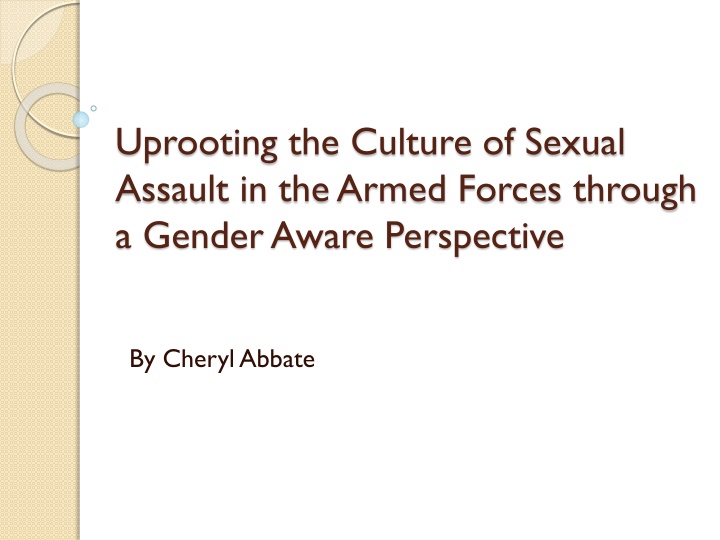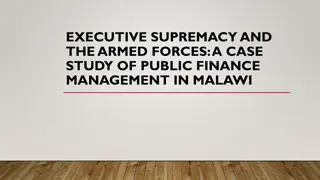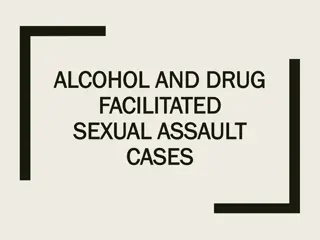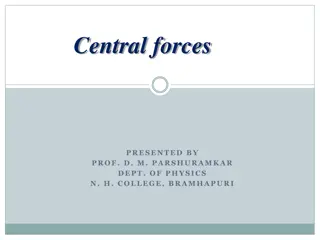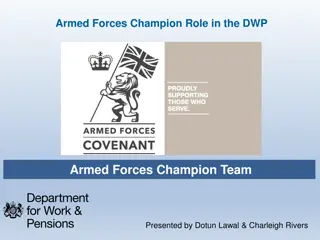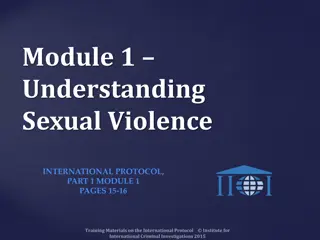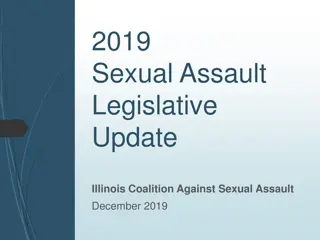Uprooting the Culture of Sexual Assault in the Armed Forces: A Gender-Aware Perspective
This presentation sheds light on the pervasive issue of sexual assault in the military, emphasizing the need for a gender-aware approach to uproot the culture of abuse. It outlines the alarming statistics, challenges traditional perceptions, and discusses proposed solutions, highlighting the importance of prevention strategies and systemic changes over reactive measures.
Download Presentation

Please find below an Image/Link to download the presentation.
The content on the website is provided AS IS for your information and personal use only. It may not be sold, licensed, or shared on other websites without obtaining consent from the author.If you encounter any issues during the download, it is possible that the publisher has removed the file from their server.
You are allowed to download the files provided on this website for personal or commercial use, subject to the condition that they are used lawfully. All files are the property of their respective owners.
The content on the website is provided AS IS for your information and personal use only. It may not be sold, licensed, or shared on other websites without obtaining consent from the author.
E N D
Presentation Transcript
Uprooting the Culture of Sexual Assault in the Armed Forces through a Gender Aware Perspective By Cheryl Abbate
Agenda (1) Statement of the Problem (2) Diagnosis of the Problem (3) Solution to the Problem
The Problem 26,300 (approx) occurred in 2012 in the military (up 34.5% from 2010) Only 3,000 (approx.) were reported Only 300 (approx). were prosecuted; there is a .9% conviction rate 23-28% of women will be sexually assaulted while serving their country (this is twice as high as the civilian sector); 11% will be raped 53% of these crimes were MALE on MALE assaults Only 14% of victims who report their assaults are males **Source: SAPRO 2012 Annual Report
So, No. Sexual assault in the military is not: A result of confusion about consent A result of out of control hormones A crime that happens after someone has too much to drink A woman s issue; it s not about the damsel in distress
There is still a misperception that this is a women's issue and women's crime. It's disheartening that we have such a differential between the genders and how they are choosing to report. Nate Galbreath, the senior executive adviser for the Pentagon's sexual assault prevention office.
Proposed Solutions Sexual Assault Prevention and Response Office (SAPRO) 2013 Strategic Plan: Bystander Intervention Victim Reporting Holding Commanders more accountable Punishing wrongdoing Victim Support Pentagon: August 2013 Memorandum from Secretary of Defense Chuck Hagel: improved victim legal support expansion of victim rights enhancing protections enhancing pretrial investigation ensuring investigative quality Congress: Military Justice Improvement Act (Senator Kirsten Gillibrand) Put the authority to investigate and prosecute sexual assault crimes into the hands of qualified legal experts with legal training.
Inadequacies of the Proposed Solutions Only addresses what has happened after assault has occurred (response), rather than sexual assault prevention. We need a reevaluation of military culture in addition to structural changes/criminal justice reform.
Part II: A Proper Diagnosis of the Problem
What we need. We need to take seriously the psychological and sociological research that has been conducted on gender, specifically masculinity, and how masculinity is connected to sexual violence and other anti-social activities ..we need a Gender Aware Perspective (Christopher Kilmartin)
A note about Gender and Sex Male Vs Female Man vsWoman/ Masculinity vs Femininity
Hypermasculinity/ Militarized Masculinities Obsession with bodily strength Homophobia Obsession with power Obsession with domination Disdain for the emotions Disdain for the feminine
My Focus A critical reflection of the of the hypermasculine culture of the military, which is connected with a desire to dominate feminine others through aggressive and violent means. Hypermasculinity= a recipe for sexual assault
Bodily Strength and Domination Stoicism Dominating one s bodily weaknesses Physical exertion, lack of sleep, and exposure to climate variation Performance of physically grueling activities regardless of exhaustion, pain, or injury Pain is weakness leaving the body
Dehumanization and Dominance Dominating one s emotions; disabling one s empathetic responses to killing others Soldiers are formed into individuals who are able and willing to kill other human beings in order to protect the nation Mechanisms of moral disengagement Target acquisition Derogatory names such as gook zit towel- head and faggot
Violence and Dominance Desire to dominate others through aggression and violence Basic Training Traditions What makes the green grass grow? Blood, blood! Blood makes the green grass grow! Kill kill kill! Cadences that glorify killing and violence Bodies Bleeding Bodies: Load another magazine, in my trusty M16. Cuz all I ever wanna see is bodies, bleeding bodies. Throw another hand grenade! Should have seen the mess I made. Cuz all I ever wanna see is bodies, broken bodies. Stab em with the bayonet! If he squirms you're not done yet! Cuz all I ever wanna see is bodies, cut-up bodies.
Violent Cadences Captain Jack: I m gonna be a killin man A cuttin man A shootin man A stabbin man The best I can For uncle Sam. Down by the River: Down by the river; took a little walk; ran into the enemy; we had a little talk; I didn t like their attitude; didn t like the way they walked; So I pushed em; I shoved em; I threw them in the river; laughed as they drowned.
Power and Dominance Military s Hierarchical structure Top-down authoritarian structure which fosters a master/slave dynamic between subordinate soldiers and superiors who have unlimited authority that subordinates must accept without question Unquestioning obedience Absolute authority
Conclusion: Militarized Masculinities The military virtues which are assumed to be necessary for effective fighting are the following: Stoicism; non-femininity Emotional detachment Power Domination through violence and aggression
Consequences of Military Masculinities Disdain for the feminine Those who are not real men should submit to the power and demands of the truly masculine. A sense of entitlement Soldiers are indoctrinated with the same lesson that motivates sexual aggressors: a real man has power and control, a real man dominates; a real man is on top. A sense of inferiority or frustration
How is this related to sexual assault? Institutions, like the military, that endorse masculine norms are found to have higher rates of sexual assault and harassment than other organizations (Gutek 1985; Gruber 1997) Sexual violence is usually motivated by violence and a desire to conquer and control the victim (Groth 1979; Hunter 2007, 19; Kilmartin 2005) Hypermasculinity= a recipe for sexual assault (and other anti-social activities)
The psychological thesis Sexual assault is often a response to a feeling of powerless: society has defined a real man in such a masculine way that certain males hit a wall of despair trying to achieve this masculine identity without success Men attempt to overcome their inadequacies and express their masculinity through means of sexual aggression: finally they are able to control at least one thing in their life, namely, their sexual conquests
Psychological Thesis, Continued When soldiers are unable to live up to the often unobtainable hyper-masculine ideals of military combat soldiers, they experience a sense of masculine inadequacy and anger This response is inevitable when we consider the typical attitudes of men to constraining environments, such as the military which is authoritarian in nature: with such a rigid structure, subordinates are prone to foster anti-social behavior in order to protest such a constraining environment Sexual aggressors, then, are often insecure, men who are motivated by a desire to dominate or exert power over another being (male or female!)
Restatement of the problem Can we train Soldiers to be effective killers without indoctrinating in them vicious, hypermasculine character which gives rise to a culture of rape and sexual violence?
Is there a dichotomy? Effective fighters, with a culture of sexual violence Ineffective fighters, without a culture of sexual violence
Solution 1: A philosophy of killing Martial arts (Aikido), with a focus on the meditative component, into military training. Such training will help soldiers remain less aggressive and violent, humble, and in touch with their emotions, thus countering hypermasculine tendencies of aggression, violence, domination, and power seeking. Allows individuals to vent negative emotions in a healthy way, lest they are otherwise repressed and later manifest in even darker ways (Haffner & Vogel 2010, 148).
Aikido: A Philosophy of Killing Self Defense No first strike Techniques to counter someone else s initiation of violence by blending the motion of the opponent and redirecting the force of the attack Neutralizers the attacker without using strength; abandons the idea of fighting with brute force Emphasizes soft techniques- the art of blending with an attacker s vital energy, redirecting that energy in order to harmonize with it and so render it harmless (Raposa 2003, 10-11).
Lessons from Aikido We should eliminate fighting techniques that are excessively violent and destructive We should avoid violence and to approach conflict with minimal force We should control violence We should use violence only as a last resort, thereby preventing him from initiating demands for dominance or an act of aggression, like sexual violence, in the first place.
Solution 2 Can we soldiers be trained to kill without cultivating hypermasculinity? Are there ways to effectively conduct military operations that do not require military personnel to foster anti-social traits?
The use of unmanned aerial vehicles (UAVs) Unmanned systems, unlike soldiers who fight in ground combat, are immune to frustration, boredom, and anger which makes unethical conduct less likely (Lin, Bekey, Abney 2008) Arkin (2009: 30): combat soldiers often act on emotions such as anger, fear, frustration and revenge which often causes them to disregard military regulation and the laws of war. .the use of emotionless UAVs might, in fact, eliminate the atrocities that stem from unraveling emotions caused by the direct experience of killing others under the condition that they lessen civilian casualties and save lives
Questions? Cheryl.abbate@marquette.edu
A Final Word About Victim Blaming "We have to fight the cultural stigmas that discourage reporting and be clear that sexual assault does not occur because a victim is weak, but rather because an offender disregards our values and the law," Hagel said.
